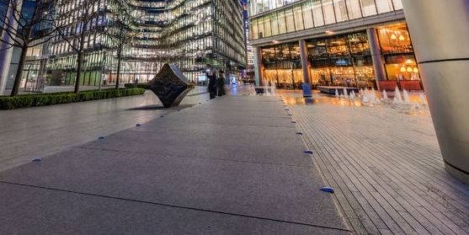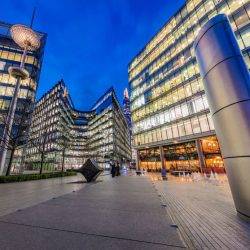June 1, 2018
Opening the door to a new workplace experience for everybody
 There’s no one way to approach diversity and inclusion initiatives. However, we’re very lucky as fellow professionals involved in creating a great workplace experience for everybody to be able to take an active and vital role in improving the setting for these initiatives. If you work at a company that is embracing diversity and inclusion, what I have set out in this commentary is simply a group of thought starters based on previous experience, pain points, and ways you could easily push forward to make spaces that better accommodate all users. At a time when 69 percent of executives rate diversity and inclusion as an important issue, it’s important for we workplace professionals to take the initiative.
There’s no one way to approach diversity and inclusion initiatives. However, we’re very lucky as fellow professionals involved in creating a great workplace experience for everybody to be able to take an active and vital role in improving the setting for these initiatives. If you work at a company that is embracing diversity and inclusion, what I have set out in this commentary is simply a group of thought starters based on previous experience, pain points, and ways you could easily push forward to make spaces that better accommodate all users. At a time when 69 percent of executives rate diversity and inclusion as an important issue, it’s important for we workplace professionals to take the initiative.















 Demand for commercial office space in central London has remained above the long-term average, with the amount of space under offer increasing, though the level of supply in the West End has continued to decline, according to the latest figures from Savills. Take-up in April reached 275,473 sq ft across 24 transactions, bringing take-up for the first four months of the year to 1.3m sq ft. The volume of transactions to complete over the month was the lowest for April in five years but overall year-to-date take-up still remained up on the long-term average for this period by 13 percent.
Demand for commercial office space in central London has remained above the long-term average, with the amount of space under offer increasing, though the level of supply in the West End has continued to decline, according to the latest figures from Savills. Take-up in April reached 275,473 sq ft across 24 transactions, bringing take-up for the first four months of the year to 1.3m sq ft. The volume of transactions to complete over the month was the lowest for April in five years but overall year-to-date take-up still remained up on the long-term average for this period by 13 percent. 


 One in four workers (28 percent) would move jobs if they weren’t allowed to work from home, increasing to nearly half (45 percent) of millennial workers. Yet while two thirds of UK employees (65 percent) can work from home, 35 percent are still not given the option of working remotely.
One in four workers (28 percent) would move jobs if they weren’t allowed to work from home, increasing to nearly half (45 percent) of millennial workers. Yet while two thirds of UK employees (65 percent) can work from home, 35 percent are still not given the option of working remotely. 
 Eight in ten workers use their personal smartphones for work purposes to make their jobs easier as almost half report wasting 10 minutes per hour in their working day due to their employers’ ineffective technology. According to the
Eight in ten workers use their personal smartphones for work purposes to make their jobs easier as almost half report wasting 10 minutes per hour in their working day due to their employers’ ineffective technology. According to the 
 Central London commercial offices under offers are at the highest point in the last 12 months and take-up is ahead of 2017 levels compared with this point last year, new data from CBRE has shown. Central London office take-up for April 2018 stood at 547,900 sq ft, largely driven by pre-letting activity. Office take-up for the year to the end April 2018 was 4 percent higher than the corresponding period in 2017, standing at 3.4m sq ft. Take-up was boosted by 139,600 sq ft of pre-letting activity. Over the last 12 months, the business services sector has represented the largest proportion of take-up at 32 percent, driven by a large number of deals to flexible office providers. Take-up in April was dominated by the creative industries sector, accounting for 44 percent of take-up. The banking and finance sector (26 percent) and the business services sector (21 percent) also represented notable proportions of take-up in April.
Central London commercial offices under offers are at the highest point in the last 12 months and take-up is ahead of 2017 levels compared with this point last year, new data from CBRE has shown. Central London office take-up for April 2018 stood at 547,900 sq ft, largely driven by pre-letting activity. Office take-up for the year to the end April 2018 was 4 percent higher than the corresponding period in 2017, standing at 3.4m sq ft. Take-up was boosted by 139,600 sq ft of pre-letting activity. Over the last 12 months, the business services sector has represented the largest proportion of take-up at 32 percent, driven by a large number of deals to flexible office providers. Take-up in April was dominated by the creative industries sector, accounting for 44 percent of take-up. The banking and finance sector (26 percent) and the business services sector (21 percent) also represented notable proportions of take-up in April.


 UK office workers spend an alarmingly limited amount of time outdoors each day, claims new research from Ambius, which found that almost 40 percent spend a maximum of just 15 minutes outside, excluding their commute to work, and an additional 22 percent spend a maximum of 30 minutes outside. This is even less than prisoners, who require ‘at least one hour of suitable exercise in the open air daily’, according to UN guidelines. On average, the British workers surveyed spend more time per day at their desk or workstation (6.8 hours) than they do in bed (6.4 hours), relaxing at home (3.5 hours) or outdoors (37 mins). A lack of fresh air (57 percent), insufficient natural light (49 percent), and an absence of indoor plants (36 percent) were the biggest source of frustration for employees. Introducing indoor plants (49 percent), nicer artwork (50 percent), and a more interesting colour scheme (54 percent), topped the list of employees’ requests to improve their workplace.
UK office workers spend an alarmingly limited amount of time outdoors each day, claims new research from Ambius, which found that almost 40 percent spend a maximum of just 15 minutes outside, excluding their commute to work, and an additional 22 percent spend a maximum of 30 minutes outside. This is even less than prisoners, who require ‘at least one hour of suitable exercise in the open air daily’, according to UN guidelines. On average, the British workers surveyed spend more time per day at their desk or workstation (6.8 hours) than they do in bed (6.4 hours), relaxing at home (3.5 hours) or outdoors (37 mins). A lack of fresh air (57 percent), insufficient natural light (49 percent), and an absence of indoor plants (36 percent) were the biggest source of frustration for employees. Introducing indoor plants (49 percent), nicer artwork (50 percent), and a more interesting colour scheme (54 percent), topped the list of employees’ requests to improve their workplace.








May 17, 2018
What exactly is driving the global workplace conversation?
by Andrew Mawson • Comment, Facilities management, Workplace design
(more…)